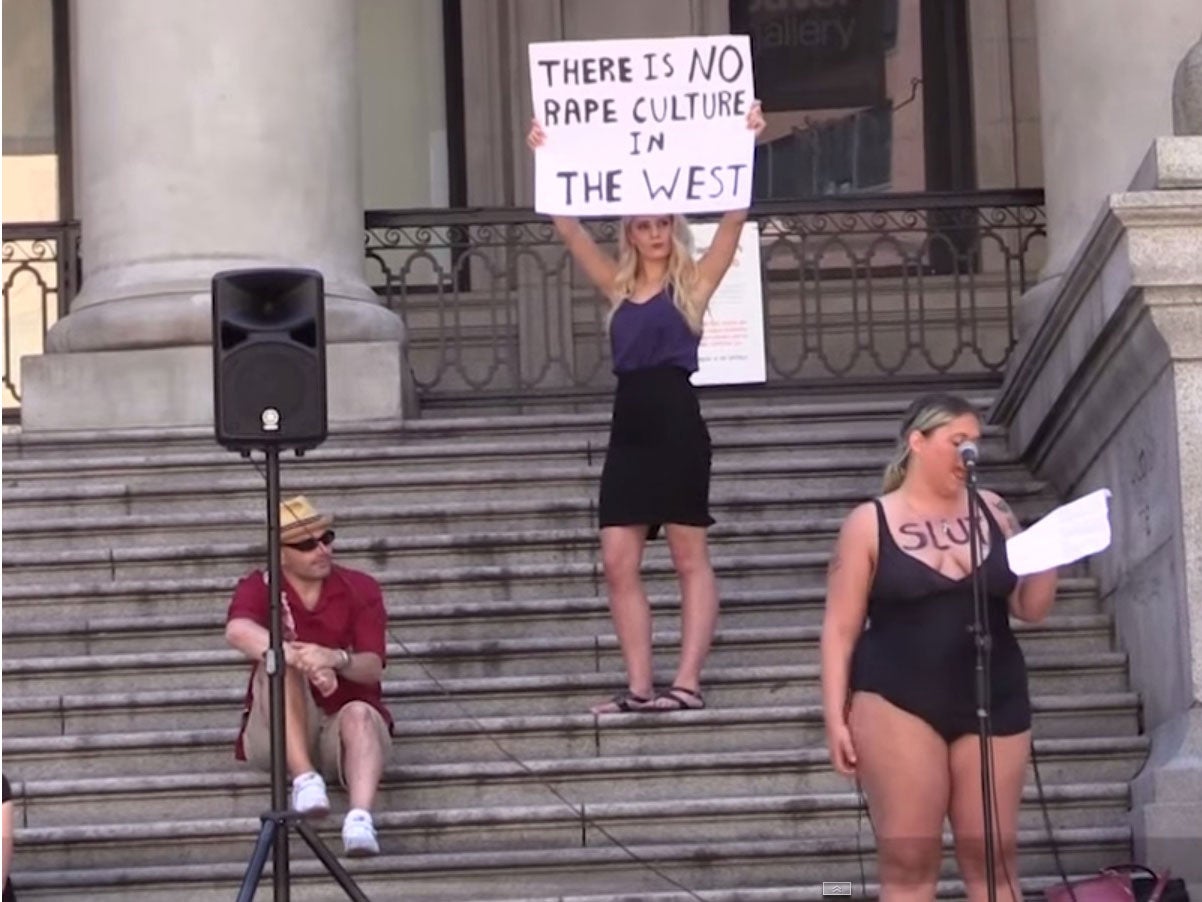Is there really no rape culture in the West?
After an American reporter sensationally claimed that it didn't exist yesterday, I decided to look at the facts for myself


Laura Southern, a reporter with TheRebel, attended a SlutWalk demonstration in Vancouver yesterday and held up a placard reading “There is no rape culture in the West”.
It really made me think: wow, how completely wrong can someone be?
The term “rape culture” was first used by feminists in the 1970s, and unfortunately remains relevant today. It describes a culture where acts of sexual violence are normalised, and rapists protected by public opinion.
Approximately 85,000 women are raped in England and Wales every year, which on average is just over 230 a day. And over 400,000 women are sexually assaulted every year. Why might this be? What else can possibly explain this ugly phenomenon?
1. Women are taught ‘not to be raped’
Above: Two examples of poster campaigns from the NHS (L) and Sussex Police (R) that have been accused on victim blaming
From anti-rape nail polish to the "hairy leg stockings", women are expected to take precautions to prevent rape. The responsibility for rape is placed upon the shoulders of women, which feeds neatly into a culture of victim blaming and slut-shaming. The idea that women are ‘asking for it’ if they’re drinking or out late or wearing a short skirt or walking home alone, is very pervasive.
It conveniently denies the fact that women are raped in baggy clothes and burkas and in their homes and at work and at all times of the day and when they’re stone cold sober. Which would we prefer? A society where women are hyper vigilant in guarding themselves against rape and are suspicious and fearful of men, or one where men don’t rape?
2. Rape isn't believed, or goes unreported
False reports of rape are often pounced on by the media and "anti-feminists", despite the fact that false reports of rape are no more common than false reports of any other crime. The Crown Prosecution Service (CPS) states that false reports of rape are ‘very rare’ and make up only 1 per cent of cases.
However, the myth that it’s common for women to lie or make up stories about rape discourages many victims from reporting their experiences to the police. CPS estimated in 2012 that as many as nine in ten rapes are never reported. It’s hardly surprising, when some survivors of rape are even pressured into dropping charges by the police.
3. Rape is trivialized within pop culture
Sansa Stark and Ramsay Bolton in the terrible wedding scene in Game of Thrones season five
From rape jokes to the way sexual violence is presented in films and TV shows (I’m looking at you, Game of Thrones), rape is routinely normalized and trivialized in popular culture. It’s used as a shock tactic, and as a lazy way to definite male characters or paint a setting as “gritty” and “dangerous”.
More often than not, the effects of rape are not explored and the impact on the victim is skipped over. In the UK, 1 in 5 women between the ages of 16 and 59 have experienced some form of sexual violence. 1 in 3 female university students have been the victims of sexual assault. So maybe it’s time we stopped making it into a punchline, and instead presented sexual violence in a more meaningful and nuanced way.
4. Consent isn't understood in the way it should be
As a society, we still seem to operate with the belief that unless the victim screams “no!” and fights back, it cannot possibly be rape. This feeds into the idea that there are “grey areas” when it comes to sexual assault, and that certain kinds of rape are “worse than others’”.
Survivors are further discouraged from reporting to the police, because they believe that what happened to them wasn’t serious enough or violent enough to be considered “real rape”. But the bottom line is very simple. Only yes means yes. Sex without consent is rape.
5. We believe unhelpful myths about who can be a rapist and victim
The idea that rapes are carried out by psychotic strangers in dark alleyways still holds great cultural sway. We find it very difficult to reconcile our collective selves with the fact that anyone can be a rapist, because it’s such an uncomfortable truth. Rape Crisis England & Wales estimates that 90 per cent of rapes are committed by someone known to the victim.
And it’s not just young, attractive, cisgender women who are raped. Women and girls can be raped at any age, regardless of their class, culture, race, faith, ability or sexuality. Although it’s largely those who identify as female who are the victims of rape, those who identify as men can be raped too (and it's believed that 9,000 are every year).
And yes, there are also women who perpetrate sexual violence, just like there are men raped by other men. Trans men can be raped. Trans women can be raped. Which is to say, there is no hierarchy - the experiences of all victims are valid.
All of the above is rape culture in action. It’s not made up. Laura Southern is either misinformed, or wilfully closing her eyes to the reality of rape culture. The West that Southern appears to believe in sounds very pleasant, but it’s a complete fantasy.
Join our commenting forum
Join thought-provoking conversations, follow other Independent readers and see their replies
Comments